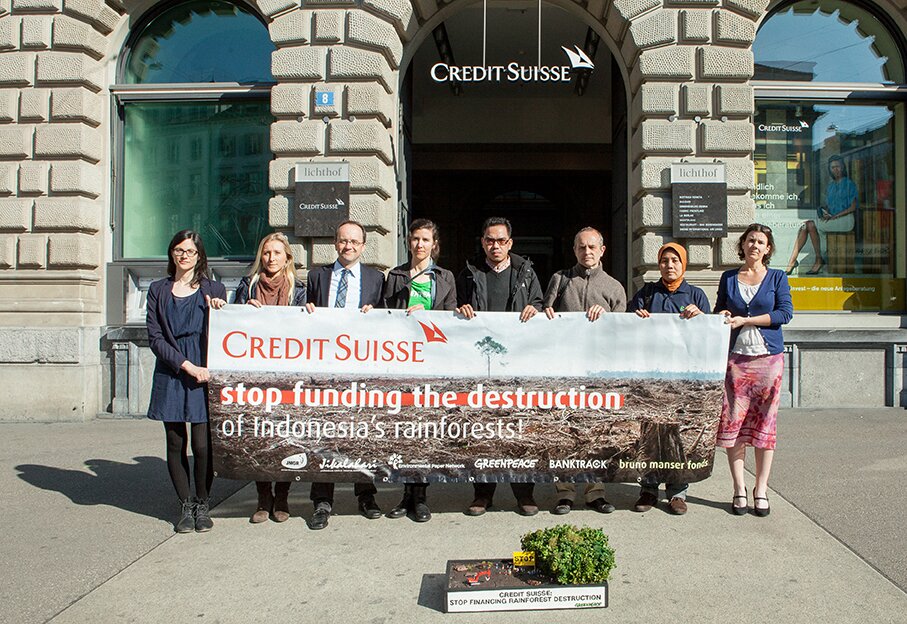A landmark commitment by one of the world’s largest producers of tissue and paper to stop cutting down Indonesia’s prized tropical forests is under renewed scrutiny as the company prepares to open a giant pulp mill in South Sumatra. To fanfare more than three years ago, Asia Pulp and Paper promised to use only plantation woods after an investigation by one of its strongest critics, Greenpeace, showed its products were partly made from the pulp of endangered trees.
Greenpeace welcomed the announcement as a breakthrough and the company, long reviled by activists as a villain, rebranded itself as a defender of the environment, helping it to win back customers that had severed ties. At the same time, it was pressing ahead behind the scenes with plans to build a third pulp mill in Indonesia.
When it went public with its plans for the OKI mill in 2013, APP announced it would produce 2 million tons a year and then earlier this year acknowledged the mill’s capacity could in the future increase to 2.8 million tons.
New research released Wednesday by a dozen international and Indonesian environmental groups estimates that APP will face a significant shortfall in its supply of plantation-grown wood after the new mill begins operating, even at a 2.0 million ton capacity. The company could then face a choice between using higher-cost imported wood or looking the other way as its suppliers encroach upon virgin forests.
“APP, while it has been presenting itself as a champion of zero deforestation, is building one of the world’s biggest pulp mills,” said Christopher Barr of Woods & Wayside International, one of the organizations involved with the report.
“There will be a great deal of pressure to ensure it receives adequate supplies of wood to keep it operating at full capacity,” he said. “Our analysis shows the group’s existing planted area in South Sumatra is unlikely to produce the volumes of wood the mill is expected to consume at projected capacity levels.”
How the mill, which could operate for more than half a century, is fed will be a factor in the survival of Indonesia’s tropical forests and the endangered wildlife they shelter. More generally, the draining and destruction of peatlands for forestry or agriculture will over decades release vast amounts of carbon that could jeopardize Indonesia’s ability to meet its emission reduction targets under an international agreement due to be signed within days.
The report estimates that APP’s plantations in South Sumatra have never produced half of the wood needed to feed a 2.0 million ton a year pulp operation. That shortfall is compounded by devastating forest and peatland fires across Indonesia last year that destroyed more than a quarter of APP’s planted trees in South Sumatra, according to an on-the-ground survey by Hutan Kita Institute and other civil society groups.
The company said it would it respond to concerns about the mill.
APP is the crown jewel of the Sinar Mas conglomerate, one of Southeast Asia’s largest companies. For a time it was a pariah in financial markets after defaulting in 2001 on $13.9 billion of debt, which still ranks as the biggest default by a company from a developing nation. It has secured Chinese funding for the OKI mill.
The draining of peatlands, which make up the bulk of the concession land in South Sumatra that supplies APP, is a fraught issue for Indonesia’s neighbors. Record fires on peatlands and forests last year caused $16 billion of losses for Indonesia, according to the World Bank, and sent a smoky, health-damaging haze across the country and into Singapore, Malaysia and Thailand.
The mill and its plantations, meanwhile, affect the livelihoods of thousands of people who have lived for decades on land used by APP. The company is embroiled in hundreds of land use conflicts across Indonesia and has yet to reach an agreement with any community after vowing to settle such disputes in 2013
Once the new mill begins operating, “I think it will be even more difficult for communities to get their land back” said Aidil Fitri, of Hutan Kita Institute, which is advocating for two communities in conflict with APP in South Sumatra.
“Now they have OKI mill and we believe they need more lands for their plantations,” he said. “On the other side, the communities who have conflicts with APP need their lands back for their livelihood, to do agriculture, not for acacia plantations.”
Greenpeace forests campaigner Andy Tait said APP has maintained it will only supply the mill with plantation or imported wood. But he acknowledged that APP’s assessment that its plantation wood supply is adequate predates last year’s “horrendous” fires, which heavily affected the company.
“We don’t see any sign of APP pulling back from its commitments on no deforestation at this stage and it would obviously be commercial suicide for them to do so,” he said. “But this mill construction raises a number of critical questions that need to be addressed.”
Indonesia (AP)






